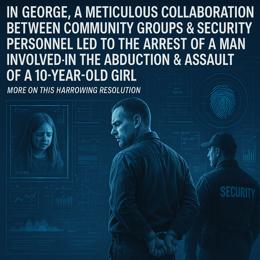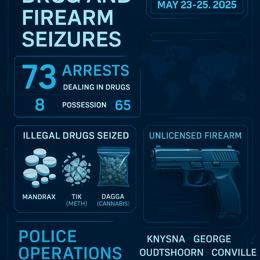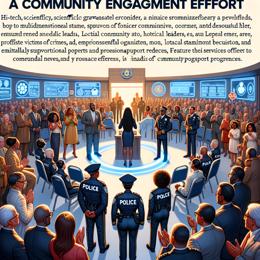Image created by AI
Primrose Principal Survives Targeted Shooting, Forgives Pupil Assailant
In a catastrophic twist of events that shook the community, Noko Selepe, the principal of Primrose Primary School, found himself in the line of fire, targeted by one of his own students. Last Friday, amidst an unexpected blackout due to load-shedding, a grade 6 pupil armed with a gun aimed at Selepe with lethal intent. The account that unfolded is not only one of survival and courage but a stark representation of the hidden dangers within educational institutions.
The assailant, a mere 13-year-old boy whose identity remains protected due to his age, was taken into custody following the incident. Evidence suggests the attack on Selepe was a calculated move, with an alleged hit list in play and a specific focus on those within the school discipline hierarchy—Selepe, the class teacher, and the deputy principal.
Gauteng education MEC Matome Chiloane provided insights into the meticulously orchestrated plan spurred by malcontent towards the school's disciplinary actions. Disturbingly, a WhatsApp group had been created leading up to the day of the shooting, further underscoring the terrifying intentionality of the plot.
During an emotionally charged interview from his hospital bed, a recovering Selepe recounted the fearful moments when the adolescent confronted him. The principal's experience and instincts led him to perceive a dangerous shift in the pupil's demeanor. This acute awareness, however, was not enough to foresee the swift pull of a trigger that left Selepe wounded on the ground—a bullet lodged near his abdomen.
"I pretended to be dead," Selepe recounted, a ploy that ultimately may have saved his life as the young assailant prepared for a second, potentially fatal shot. This harrowing decision, made amidst a surge of adrenaline and survival instinct, is a testament to the frightening reality educators can face with inadequate security measures and the presence of firearms in schools.
Shockingly, the father of the shooter, reportedly a security company owner, has also been placed under arrest, raising questions about gun accessibility and parental responsibility. The attack has highlighted an urgent need for enhanced security protocols and preventative measures against such violence within the schooling environment.
Despite the ghastly nature of the event, the heart of Selepe offers forgiveness to the boy, yet with an unyielding stance—the pupil cannot return to Primrose, for the safety and mental wellbeing of students and staff alike. He also voiced astonishment over the lack of immediate concern shown by the boy's parents, who have failed to visit him post-shooting.
Selepe's ordeal reiterates the crucial demand for strengthened ties between parents and educational bodies. "The collaboration between parents and teachers will help a lot," he asserts, emphasizing the collective role in ensuring that dangerous weapons are kept far from the school grounds and the students it serves.
As the community reels from the incident, the key message remains clear—schools are a place for nurturing, not violence. With Selepe's planned return to his vital role after recovery, the resolve to safeguard the sanctity of the education system stands firm. The court date for both the pupil and his father is set for March 19 at the Germiston magistrate’s court, where the full extent of this episode’s legal consequences will begin to unfold.










